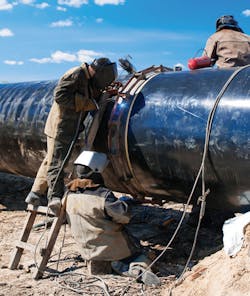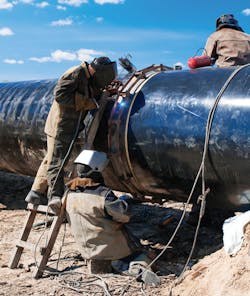Addressing the skilled labor shortage
Technical schools could be the answer to the industry's scarcity of qualified workers
Darrin Brust,Universal Technical Institute, Houston
If you do a simple Google search for "skills shortage in oil and gas," you'll find pages of articles with titles like "Skills Shortages in a Booming Market: The Big Oil and Gas Challenge," "Labor and Skills Crisis Could Stall Oil and Gas Boom," "Transferable Skills Are A Must in Oil, Gas Industry's Labor Shortages," and "Action Needed on Growing Skills Shortage in Oil and Gas Industry." One recent article, in particular, titled "Blue-collar jobs need better image amid labor shortage, leaders say" really resonated with me, especially since the Eagle Ford Shale is practically in our back yard here in Houston.
The article explains that domestic energy development is spurring demand for skilled mechanics. In Texas, as well as other parts of the country, the development of our shale resources is leading to billions of dollars in new projects, and the energy companies need skilled workers to operate and maintain them. Despite the fact that thousands of workers are flocking to work in oil and gas fields from all over the country, companies are still struggling to fill hundreds, if not thousands, of these blue-collar jobs.
Many industry experts blame the aging workforce and the over-abundance of work. While those are both valid reasons, blue-collar jobs continue to have a negative image to many in our upscale culture. In addition, many high school students are not well-informed about all of the different career options available to them after graduation, many of which don't require degrees from traditional four-year universities.
TV personality and producer Mike Rowe of "Dirty Jobs" fame recently established a mikeroweWORKS Foundation/UTI Scholarship program for those pursuing technical education at UTI. He has said, "Mechanics are still thought of as grease monkeys. In truth, they're more like rocket scientists today. The skilled trades, once held in high esteem, are now seen as some kind of vocational consolation prize."
Mike is absolutely right. The truth is technical schools like Universal Technical Institute (UTI) can open up a world of high-paying opportunities to graduates. While most of our students enroll at UTI with the intention of working at a car dealership or opening their own repair shop, some of the graduates, particularly from our Diesel & Industrial Technology program, have landed jobs in the oil and gas industry and are well compensated for their knowledge and skills.
Today's gasoline and diesel engines are complex systems. Advanced, computer-based technologies are at the heart of the modern industry. The age of the so-called "shade-tree mechanic" is long gone. If you want to see STEM in action, you should watch our students use algebra to calculate compression ratios on an engine, or see a hydraulics student calculate applied forces using pressure gauges along with bore measurements.
Do these jobs require hard work? Most definitely. Will you get your hands dirty? Absolutely. Do they offer attractive career paths? A most resounding "yes."
Many people think that working in oil and gas requires an engineering degree or MBA. And yes, the industry does still need plenty of college graduates with four-year degrees. But, in reality, these companies' biggest need right now is for workers with technical skills, which don't necessarily require a four-year degree.
An industry publication recently reported that the largest growth in energy sector job postings are in support areas, such as oilfield services, due to the fact that more and more projects are moving into the production phase. They need welders, operators, and – what resonates with us – diesel technicians.
Companies like Shell, Marathon, and Halliburton approach us continually, looking for graduates to work on diesel equipment and combustible engines in the oil fields. From January 2013 to April 2014, we've graduated approximately 630 students from our Diesel programs, and about 100 of those graduates moved on to positions in the oil and gas industry. I think it's safe to say there will continue to be a demand for these graduates in the future, especially if shale development in the United States and elsewhere continues at the current pace.
With the transportation industry as our primary focus, I would be remiss if I didn't say that a skills gap exists in this industry segment as well. Along with the high demand for skilled technicians on oil rigs, in processing plants, and other facilities, the energy industry is driving growth in all of the support industries as well. We are seeing surges in business in the transport diesel repair shops, rail and marine included, along with the spike in demand for welders, machine shops, tire shops, etc.
The skills gap in the oil and gas industry, as well as the transportation industry, continues to widen. Technical education is already proving to be a viable solution. We are not blind to the fact that some members of the for-profit sector need improvement. However, proprietary institutions governed properly and operated with integrity, can convert our nation's high skills shortage into an abundance of highly skilled technicians and craftsmen, powering our economy into international leadership.
At Universal Technical Institute, our aim is to continuously improve upon our excellent student outcomes. More than 60% of UTI students graduate, a rate significantly higher than that of two-year public colleges. Furthermore, we are very proud of the fact that four out of five UTI graduates find employment in their fields of study within one year of graduation.*
A relationship between oil and gas companies and technical schools can be a win/win situation for everybody involved. The employers are able to add a qualified, knowledgeable asset to their workforce and the employee is able to build a lengthy, high-paying career that he or she can be proud of.
The jobs are clearly out there, but we need people, especially high school graduates and military veterans, to realize that blue-collar jobs don't have to mean blue-collar wages.
About the author
Darrin Brust is campus president at Universal Technical Institute - Houston and can be reached at [email protected].
*Approximately 11,400 of the 12,200 UTI graduates in 2012 were available for employment. At the time of reporting, approximately 9600 of those available were employed within one year of their graduation dates, for a total of 85%.


